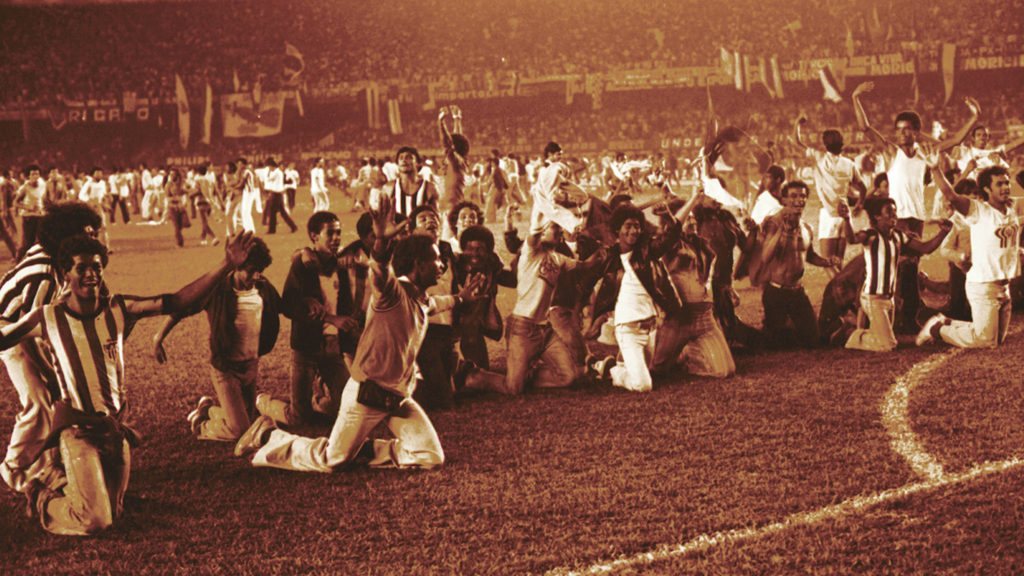Review: Strive, Strive, Strive (2021)

Personally, they had me at the very beginning, with their black and white kits and the proclaimed fanatical support of their fans, regardless of what the actual results of the club are, standings- and finances-wise. But Atlético Mineiro is more than just a football club from Brazil, a country known for its undying love for the game. Being a Galo (“rooster”) supporter is a state of mind and it shown with clarity and passion in the documentary Strive, Strive, Strive by Sérgio Borges and Helvécio Marins Jr that had its international premiere at the International Film Festival Rotterdam.
Atlético Mineiro was the first in many things. It was the first football club founded in the city of Belo Horizonte. Back in 1908, Belo Horizonte was just a small settlement based on urban planning, the first of its kind in Brazil. Even though founded by a group of upper-class students, Atlético was the first club to open its doors to all the races and social classes present in the town. Their rivals, América Mineiro and Cruzeiro, both had their own agendas: América was an elitist club, while Cruzeiro was closely associated with the community of the Italian immigrants. Atlético was also the first Brazilian club to have a female supporters squad and women in the management. And a story how they played in all-black kits during the World War I is quite touching: the white cloth was sent to the frontline medics.
Atlético was also the first Brazilian club to take a European tour after the World War II and to bring the Brazilian football to Europe and the European football to Brazil. However, despite their pioneering efforts, their “track record” was not that stellar both on the national and the continental level. The club never lacked the support from the fans, the owners and the management, and it certainly did not lack the talented players but it lacked the political support from the top of the country, which caused Atlético to suffer many cases of injustice on and off the pitch.
There are two reasons for that. The first is more prosaic, the clubs from Rio de Janeiro, especially Flamengo, were always more in favour with the financial lobbies, the government and the national football association, and Atlético Mineiro was always considered to be a regional, provincial club. Secondly and more importantly, as an anti-racist, anti-elitist people’s club, Atlético both officially and unofficially opposed the right-wing dictatorship that was in power for the great part of the second half of the 20th century. The players, the fans and the management spoke openly about it and the club served as a symbol of resistance of sorts.
Strive, Strive, Strive is a film about the club’s history that culminates with the moment of glory in 2013 when Atlético won Copa Libertadores, which is the South American equivalent to Champions League. Although it seems like a run-of-the-mill sports documentary at first glance, deftly collaged from the archival material (both photo- and video) and the interviews with the sports journalists, former and current players, supporters and the key figures in the club management (both past and present), the perspective is completely different. Both Borges and Marins are fans and are not a bit ashamed of it. Most of the interviews are conducted on and around the stadium, while the soundtrack consists mainly of the fan songs in different styles, from samba to thrash metal. Strive, Strive, Strive is aimed at making the viewer a future supporter, be it a casual of a devoted one and it succeeds with its sincerity and amazing energy for all of its 110 minutes of runtime.
Original title: Lutar, lutar, lutar
Year: 2021
Runtime: 110’
Country: Brazil
Language: Portuguese
Directed by: Sérgio Borges, Helvécio Marins Jr
Written by: Sérgio Borges, Helvécio Marins Jr, Lucas Campolina, Fred Melo Paiva
Cinematography by: Alexandre Baxter
Editing by: Lucas Campolina
Music by: Pedro Durães
Sound design by: Pedro Durães
Produced by: Sérgio Borges, Helvécio Marins Jr, Lucas Campolina, Fred Melo Paiva
Production companies: Filmes Fractais, Olada
















